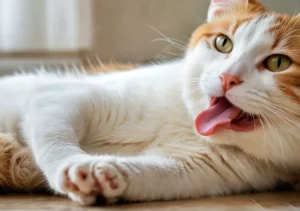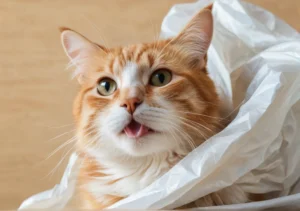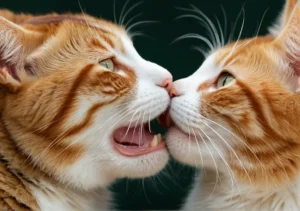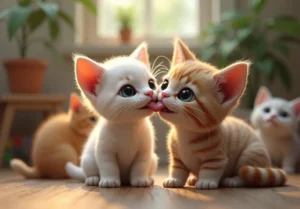Have you ever caught your furry feline friend licking mirrors around your home? It may seem like an odd behavior, but there are reasons behind it. Let’s explore why cats engage in this peculiar habit and what it might mean.
Cats are known for their quirky behaviors, but licking mirrors can leave any cat owner scratching their head in confusion. While it may seem strange, there are a few possible explanations for why your cat is drawn to licking mirrors.
Curiosity or Playfulness
If you’ve ever caught your cat licking a mirror, don’t worry – they’re probably just being curious or playful! Cats are known for their innate sense of exploration, and mirrors provide a unique and intriguing surface for them to investigate. Licking the mirror could be your feline friend’s way of engaging with their environment in a playful manner.
Cats often use their senses, including taste, to interact with the world around them. So, if your cat is licking the mirror, they may simply be trying to understand this new and shiny object in their space. It’s all part of their natural instincts to explore and engage with their surroundings in unconventional ways.
Reflection Intrigue
For some cats, the reflection in the mirror can be a source of fascination or confusion. When your cat sees their own reflection, they may perceive it as another cat or creature and try to interact with it. This can lead to attempts to touch or lick the image in the mirror, as they try to figure out this mysterious “other cat.”
One interesting angle to consider is that some cats may actually be trying to groom or establish dominance over their reflection. In the wild, cats use grooming as a way to bond with other felines and show their superiority. So, when your cat licks the mirror, they could be displaying similar behaviors towards their own reflection. It’s a fascinating glimpse into your cat’s natural instincts and behaviors.
Additional tip: If your cat’s mirror-licking behavior becomes excessive or obsessive, it’s always a good idea to consult with your veterinarian to rule out any underlying health issues or stress-related causes.
Remember, every cat is unique, so their reasons for licking mirrors may vary. Embrace their quirky behavior with patience and understanding, and enjoy watching them navigate the world in their own unique way.
Scent Marking
Cats are all about leaving their mark, and licking mirrors is just one of their quirky ways to do so. You see, our feline friends have scent glands in their mouths, and when they lick surfaces like mirrors, they’re essentially claiming that spot as their own. It’s like they’re saying, “Hey, this mirror is mine!” So, if you catch your cat in the act, it’s likely just their way of marking territory or feeling secure in their environment.
Dental Health Concerns
While mirror licking may seem harmless, it could also be a subtle sign that something is amiss with your kitty’s dental health. If you notice your cat licking mirrors frequently, it might be worth scheduling a visit to the vet. Excessive licking of surfaces can sometimes indicate underlying dental issues that need attention. So, don’t delay in getting your furball checked out to rule out any potential problems.
Additional Insight:
If you observe your cat licking other objects along with mirrors, such as furniture or walls, it could be a sign of stress or anxiety. Cats sometimes resort to excessive licking as a coping mechanism when they’re feeling overwhelmed. In such cases, providing a calm and comforting environment for your cat can help reduce their stress levels and curb the behavior.
Redirecting Behavior
If your cat seems to have developed a habit of licking mirrors, it could be a sign that they are feeling bored or stressed. To help redirect this behavior, try engaging them in interactive playtime or providing them with stimulating toys. Cats are intelligent beings who need mental stimulation to thrive, so keep them entertained with activities that cater to their natural instincts. By offering alternative outlets for their energy, you can help discourage mirror licking behavior.
Enriching the Environment
Creating an enriching environment for your feline friend can work wonders in reducing mirror licking tendencies. Invest in scratching posts, climbing trees, and engaging toys to keep your cat entertained and mentally stimulated. Cats love to explore and play, so providing them with a variety of options can help deter unwanted behaviors like excessive mirror licking. When a cat’s environment is fulfilling and exciting, they are less likely to resort to unusual habits for entertainment.
- Provide vertical space: Cats love to climb and perch up high. Offering vertical spaces like cat trees or shelves can satisfy their natural desire to explore and observe.
- Rotate toys regularly: Keep your cat’s interest piqued by rotating their toys every few days. This will prevent boredom and encourage them to engage in different activities.
- Use puzzle feeders: Stimulate your cat’s mind by feeding them through interactive puzzle feeders. This can help reduce stress and keep them mentally sharp.
- Cat grass: Consider growing cat grass indoors for your furry friend to nibble on. Not only is it a healthy treat, but it can also help deter them from licking mirrors out of curiosity.
By enriching your cat’s environment and providing them with plenty of mental and physical stimulation, you can help curb their mirror licking habit and promote overall well-being.
Consult Your Veterinarian
If your cat’s mirror licking seems excessive or is accompanied by other concerning symptoms, it’s always best to consult with your veterinarian for a proper evaluation and guidance on managing the behavior. Your vet can help rule out any underlying medical issues that may be causing your cat to exhibit this behavior and provide personalized advice to address it effectively.
From curiosity to dental health concerns, there are various reasons why your cat may be drawn to licking mirrors. By understanding their behavior and addressing any underlying issues, you can ensure a happy and healthy relationship with your feline companion.
Addressing Potential Underlying Causes
In some cases, cats may lick mirrors out of curiosity or as a way to explore their environment. However, excessive mirror licking could also be a sign of dental problems such as tooth decay or gum disease. If you notice your cat licking mirrors frequently, it’s essential to have their oral health evaluated by a vet to rule out any dental issues that may be causing discomfort and leading to this unusual behavior.
- Environmental Enrichment: Providing your cat with interactive toys, scratching posts, and vertical space can help keep them mentally stimulated and less likely to engage in obsessive behaviors like mirror licking.
- Regular Dental Check-ups: Scheduling regular dental check-ups for your cat can help prevent dental issues that may contribute to mirror licking behavior. Your vet can recommend appropriate dental care routines to keep your cat’s teeth and gums healthy.
- Safe Alternatives: If your cat seems fixated on licking mirrors, consider providing safe alternatives such as cat-safe toys or treats to redirect their attention and discourage mirror licking.
Remember, each cat is unique, so it’s essential to observe your pet’s behavior closely and seek professional guidance if you have concerns about their well-being.
Alex, a passionate animal lover, has experience in training and understanding animal behavior. As a proud pet parent to two dogs and three cats, he founded AnimalReport.net to share insights from animal experts and expand his knowledge of the animal kingdom.




